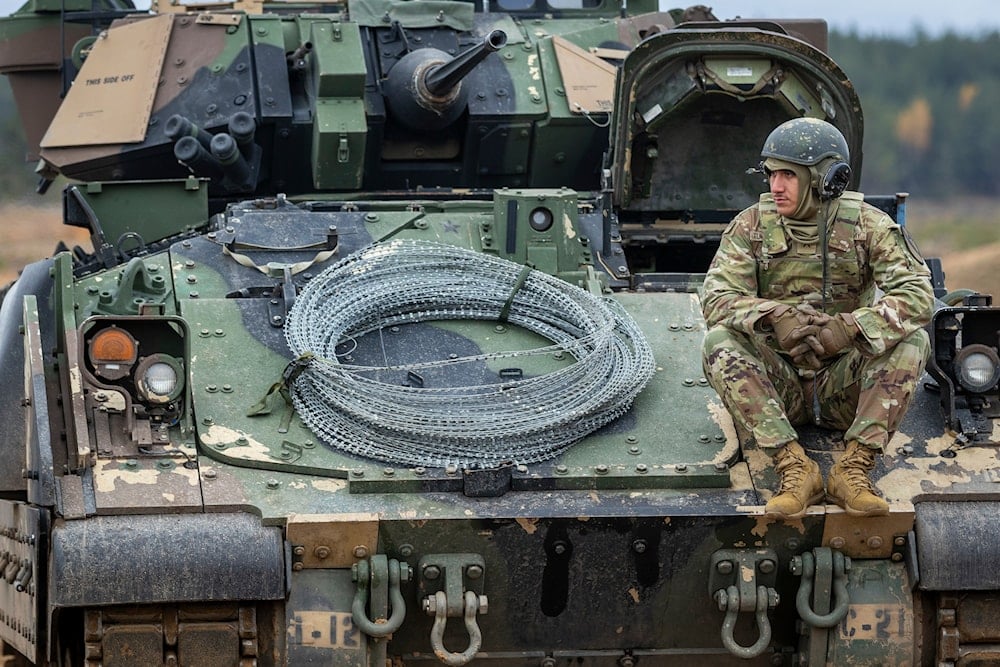US pulls out Romania unit, denies it signals full Europe withdrawal
The US is pulling back forces from NATO’s eastern flank, emphasizing Europe's growing defense capability amid ongoing Russia-NATO tensions.
-

A soldier from the US Army rests during a combined arms live fire military exercise 'Strong Griffon 2025' at a training range in Pabrade, north of the capital Vilnius, Lithuania, Wednesday, Oct. 29, 2025. (AP)
The US military confirmed on Wednesday that it is scaling back its forces on NATO’s eastern flank while insisting that this action does not constitute a full American withdrawal from Europe.
The US Army in Europe and Africa announced that the 2nd Infantry Brigade Combat Team of the 101st Airborne Division combat team will return to their Kentucky-based home unit without being replaced, following Romania’s preview of the planned reduction in forces.
"This is not an American withdrawal from Europe or a signal of lessened commitment to NATO and Article 5," it said in a statement from its German headquarters, emphasizing the alliance’s principle of collective defense.
"Rather, this is a positive sign of increased European capability and responsibility," the statement added.
Romania beats US to announcement
The US had been expected to announce troop reductions in Europe after reviewing its global military deployments, but Romania made its own statement ahead of an official US announcement.
Bucharest’s Defense Ministry stated on Wednesday that the US plans to stop the rotation of a brigade whose units are stationed in multiple NATO countries, including Bulgaria, Romania, Slovakia, and Hungary.
However, NATO quickly downplayed the significance of the planned personnel reduction amid concerns of a US withdrawal at a time when Europe is facing an assertive Russia. "This force posture adjustment will not change the security environment in Europe," the US military maintained.
US President Donald Trump has repeatedly criticized NATO and insisted that European allies boost military spending amid the war in Ukraine.
That is why the possibility of a US withdrawal is unsettling allies, particularly amid concerns that Russia might attempt to strike a NATO member in the coming years if the conflict in Ukraine subsides.
US lawmakers oppose withdrawal
Meanwhile, in a joint statement, Senator Roger Wicker and Representative Mike Rogers called the move "uncoordinated" and stated it appears to be in direct conflict with the US president's own national security strategy.
The lawmakers further expressed broader concerns about the Pentagon's ongoing force posture review process, warning they would not accept significant changes to the US military's structure that are made without a rigorous interagency process, coordination with military commanders, and proper collaboration with Congress, reiterating a position they had stated just days prior.
The Republican chairmen of the Senate and House Armed Services Committees strongly opposed the Pentagon's decision to withdraw the US brigade from Romania, calling the move uncoordinated and warning that it undermined deterrence, especially after recent alleged Russian drones had violated Romanian airspace.
US brigade withdrawal creates premature risk to US allies
The lawmakers acknowledged that the US force posture in Europe needed updating but insisted that such changes required coordination with NATO and Congress. They emphasized that Romania had been a vital ally, having met its defense spending commitments and hosted a key US missile defense system, making the withdrawal a premature risk to alliance security.
The US lawmakers further condemned the decision, arguing it sent the wrong signal to Russia and directly contradicted Trump's pressure campaign against Putin. They stated the move undermined the US strategy of demonstrating resolve.
The legislators also expressed concern that Congress was not consulted, despite bipartisan support for a robust European posture in defense legislation. Furthermore, they are now seeking Pentagon clarification on how it will mitigate the impact on NATO and assurances that other key forces in Poland and the Baltics will remain in place.

 4 Min Read
4 Min Read









